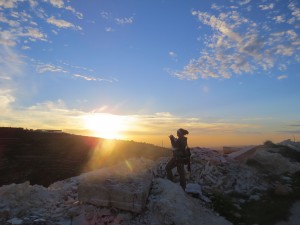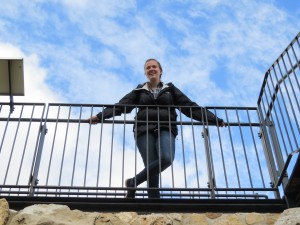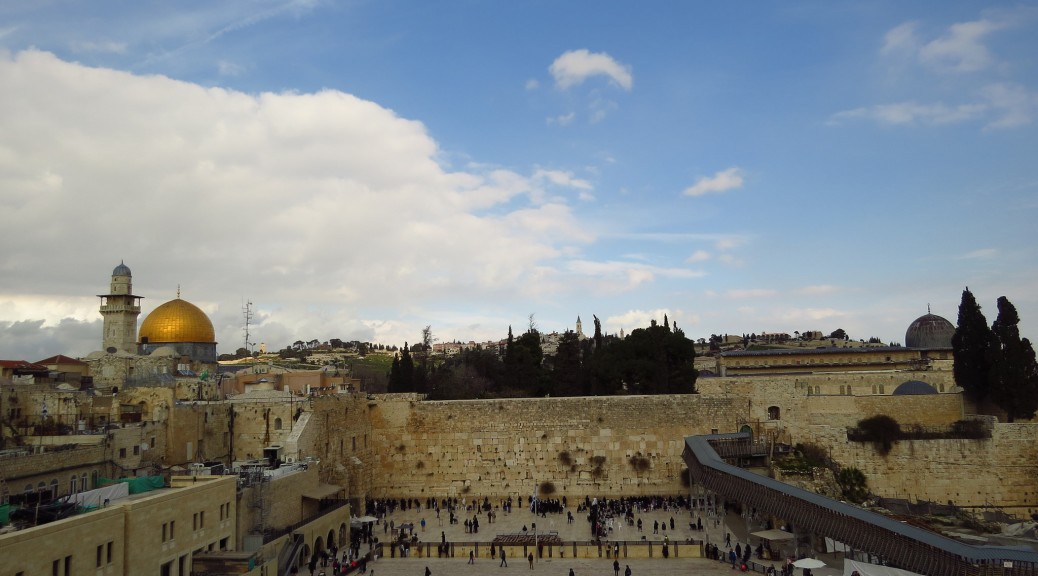February 20, 2015
We’re in Jerusalem at last! The center and capital of Israel. A city that was fought over, over 2000 years ago and is still being fought over today. A walled stone city and a modern sprawling metropolis all in one. It is truly something you have to see for yourself to understand. Nonetheless, I will try to give you a small glimpse into our world as of late (since providing everyone who reads this blog a ticket to Israel would probably cost too much…)
While in Jerusalem we are staying and studying at Jerusalem University College. JUC is a small university (we’re talking 50 people max on campus) that offers a place for undergraduates to study abroad for a semester in Israel, or students to complete a master’s degree in Biblical Geography, Hebrew, or Current Affairs. We are taking a 2-week intensive Biblical Geography course. Many days we spend out in the field, leaving at 7a.m. and not returning until dinner. I should perhaps be more specific about what I mean when I say, “in the field.” Through this course we have the opportunity to travel all  over Israel; we have “field days” in Jerusalem but also down to the Negev, out to the coast, and up to the Jezreel Valley, Galilee, and the Golan Heights, where we are learning about the events that happened in the location while we are at the location. The days we are not in the field we spend in the classroom, listening to lectures on topics we will be exploring in more depth in the field later.
over Israel; we have “field days” in Jerusalem but also down to the Negev, out to the coast, and up to the Jezreel Valley, Galilee, and the Golan Heights, where we are learning about the events that happened in the location while we are at the location. The days we are not in the field we spend in the classroom, listening to lectures on topics we will be exploring in more depth in the field later.
It is exhausting. We’re traveling all the time. We are being thrown so much new information. But it is also so cool!
This course adds an entirely new perspective to my view of the Bible. It also adds to my general knowledge of things that I never knew I wanted to know. For example, we’ve learned about the three main types of limestone found in the Holy Land “and why it matters.” We have learned what a “tel” is, have stood on top of one too many, and if you ask us about it we’ll be happy to “tell” you all about them. We’ve had fun as well, doing things like swimming (or rather floating) in the Dead Sea, sitting on top of Mt. Carmel, singing on the banks of the Jordan River, standing on top of an extinct volcano looking out over Syria, and playing in the snow in the old city of Jerusalem.
We take buses to most of our destinations so we have ample time to think about what we have been seeing. Here are three things that have struck me especially this past week or so.
1) Israel is so small! Everything is so much closer together than I imagined it growing up. For example, you can walk from Jericho to Jerusalem in one day. You can also drive from Jerusalem to Nazareth in about 2 hours.
2) Israel is an extremely diverse country climate wise. If you wanted to, you could drive from the barren desert to rolling hills, harsh wilderness, wide valleys, flat farmland, Mediterranean coast, and humid forest all in one day.
3) My knowledge of the Old Testament is getting some serious refreshing and upgrading. It has been fun to relearn some of these stories from a new, and more physically and historically accurate, perspective.
– Sarah Sutter, third-year
“Context is everything,” the saying goes. And if our place of origin,  our home, helps define us- then the context of that home is so much more than everything, isn’t it? Visiting the old city in Jerusalem today, it became so clear how the natural space we were in defined the physical place we were visiting. Simply put, it created the physical place we were in. Civilization upon civilization created the hills, just as much as the hills created the civilizations.
our home, helps define us- then the context of that home is so much more than everything, isn’t it? Visiting the old city in Jerusalem today, it became so clear how the natural space we were in defined the physical place we were visiting. Simply put, it created the physical place we were in. Civilization upon civilization created the hills, just as much as the hills created the civilizations.
When I first heard we would walk across the Hinnom Valley, I imagined a day-long trek. But a quick trot up some stairs took us in and out of the valley, to view JUC from across that space. Building on top of, and around, previous cultures created a chaotic harmony of completely unique Jerusalem culture. Viewing that culture from the rooftop today was strange. Bizarre, even. Ruins melted into new construction. Local children dodged crowds of elderly tourists. Israeli soldiers fit into the spaces between Mennonite students.
Jerusalem – a culture all its own.
It definitely made me look with new perspective at where I come from- my location, my home base, my culture and context. In Oregon the sunlight seeps up from the ground, so I highly value the warm light of grass and moss. A horizon line of mountains means I need- yearn- for that feeling of being nestled within the slope of the land. Today I learned how the Holy Land has created Jerusalem- and how Oregon has created me.
– Bethany Chupp, sophomore

